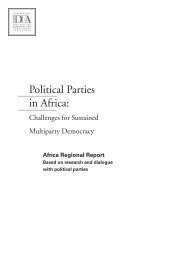Background Document - Danish Institute for Parties and Democracy
Background Document - Danish Institute for Parties and Democracy
Background Document - Danish Institute for Parties and Democracy
You also want an ePaper? Increase the reach of your titles
YUMPU automatically turns print PDFs into web optimized ePapers that Google loves.
Another key factor that prompts women to mobilise as women is the pre-transitional<br />
politics in each country. Though the circumstances of transition varied from country<br />
to country, in much of Latin America women mobilised both as several groups primarily<br />
made up of women <strong>and</strong> women organising specifically as women to press <strong>for</strong> the guarantees<br />
on women’s rights <strong>and</strong> democratisation of everyday life.<br />
In some countries as diverse as Argentina, Spain <strong>and</strong> South Africa women maximised<br />
the opportunities presented during revolutionary transitions to democracy by mobilising<br />
as women along women’s issues. In countries such as Brazil <strong>and</strong> Chile women<br />
mobilised across class <strong>and</strong> party lines to ensure that women’s equal participation <strong>and</strong><br />
representation in politics <strong>and</strong> decision making is guaranteed during <strong>and</strong> post the political<br />
transitional processes.<br />
In all transitional processes the capacity <strong>for</strong> women to mobilise as women consolidates<br />
women’s political clout <strong>and</strong> attracts the attention of predominately male political<br />
actors who tend to then harness women’s support <strong>for</strong> their own political gains.<br />
On the other h<strong>and</strong>, this can lead to the incorporation of women’s de-m<strong>and</strong>s on the<br />
political agenda if political actors begin to see women as a constituency worth co-opting.<br />
The exclusion of women from the agenda setting <strong>and</strong> women’s concerns from the<br />
agendas articulated by predominately male leaders heightens the political salience of<br />
gender equality relative to other values. Too often, women’s concerns are considered but<br />
not followed through in the actual decisions <strong>and</strong> in practice as women’s concerns seem<br />
to have an imposed duty to “give way” or yield to other important values.<br />
RECOMMENDATIONS<br />
How women’s roles in transitional politics translate into critical actions <strong>and</strong> decisions<br />
is highly controversial politics because those without voice are often ignored by those<br />
with voice. In the face of such on-going challenges, the following multi-dimensional<br />
recommendations if adequately implemented hold enormous potential to increase<br />
women’s participation <strong>and</strong> representation in politics <strong>and</strong> transition countries in the<br />
long term. In defining these recommendations, it is important to ask, how much are the<br />
national, regional <strong>and</strong> international stakeholders willing to invest in women’s empowerment<br />
<strong>and</strong> gender equality?<br />
WOMEN AS AGENTS FOR CHANGE<br />
´ Support <strong>for</strong> women to mobilise as women: Supporting women’s mobilisation as a constituency<br />
is a key investment to increase women’s effective participation in transitions. The<br />
support <strong>for</strong> women has to rein<strong>for</strong>ce women’s capacity as agents <strong>for</strong> change <strong>and</strong> cultivate<br />
robust initiatives to mobilise women as women. In order to ensure that the political spaces<br />
opened by revolutionary transitions do not get closed by supporting women to seize the<br />
opportunity offered by transitions to negotiate the changes to their condition <strong>and</strong> status.<br />
´ Additional empowerment: Cultivating <strong>and</strong> rein<strong>for</strong>cing trans<strong>for</strong>mative leadership skills<br />
among women through additional empowerment strategies that translate women’s presence<br />
into critical influence <strong>and</strong> actions to engage from an underst<strong>and</strong>ing of women’s rights<br />
as human rights <strong>and</strong> the broader democratic issues.<br />
´ Agenda setting: One way to support women in transitions is to strengthen the defining<br />
of women’s strategic interests in the agenda setting of transitional processes <strong>and</strong> institutions<br />
especially constitution drafting bodies <strong>and</strong> electoral re<strong>for</strong>ms proposals. The agenda<br />
setting support should buttress the need <strong>for</strong> the implementation of principles <strong>and</strong> values<br />
on gender equality <strong>and</strong> women’s empowerment that are written in international covenants<br />
such as the Convention on the Elimination of All <strong>for</strong>ms of Discrimination Against<br />
Women(CEDAW), which is among the most ratified of United Nations treaties.<br />
WOMEN IN POLITICS DANISH INSTITUTE FOR PARTIES AND DEMOCRACY PAGE 42
















